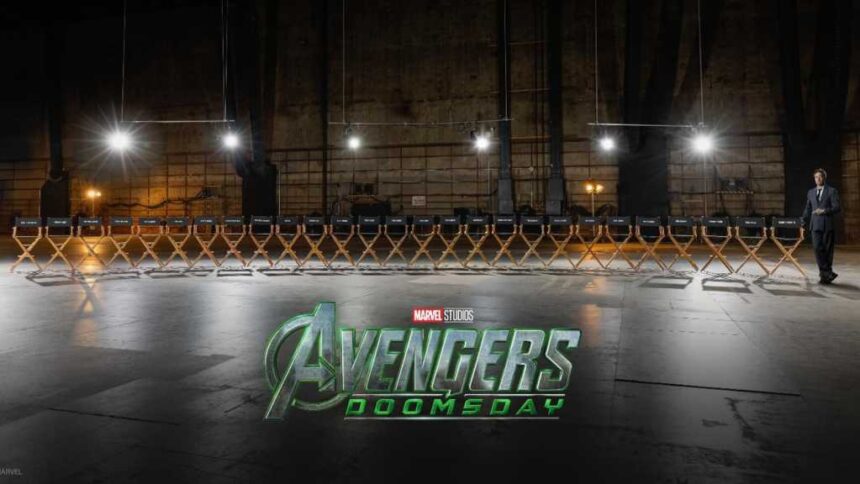Now, it seems that Evans will not be reprising his role as Captain America in the upcoming film. It is likely that his character’s arc has come to a satisfying conclusion, and his absence will allow the focus to shift to the new generation of heroes.
Overall, the cast of Avengers: Doomsday is shaping up to be an exciting mix of familiar faces and new additions. With the inclusion of mutants, The Fantastic Four, and the introduction of Dr. Doom as the new supervillain, fans can expect a thrilling and action-packed film.
As the Marvel Cinematic Universe continues to expand and evolve, Avengers: Doomsday promises to be a pivotal chapter in the ongoing saga. With surprises, twists, and epic battles on the horizon, fans can look forward to an unforgettable cinematic experience when the film hits theaters in the near future. Stay tuned for more updates and announcements as the release date approaches. The latest teaser for the upcoming film has revealed that Chris Evans will not be reprising his role as Steve Rogers, also known as Captain America. Fans of the Marvel Cinematic Universe can breathe a sigh of relief knowing that Marvel won’t be bringing Steve out of retirement anytime soon.
Instead, the focus seems to be on other beloved characters from the MCU. Let’s take a look at some of the familiar faces we can expect to see in the upcoming film:
Elizabeth Olsen as Scarlet Witch
Last seen in Doctor Strange in the Multiverse of Madness, Scarlet Witch, played by Elizabeth Olsen, met a tragic end after using dark magic to reunite with her lost children. Her actions caused chaos in the multiverse and ultimately led to her demise. While she may be gone for now, the multiverse offers endless possibilities for her return.
Benedict Cumberbatch as Doctor Strange
Doctor Strange, portrayed by Benedict Cumberbatch, also faced challenges in the last installment of his solo film. After dabbling in dark magic and battling against Scarlet Witch, he found himself in a tight spot. His absence in the upcoming film may be explained in the next installment of the Avengers series.
Scarlett Johansson as Black Widow
Black Widow, played by Scarlett Johansson, met a heroic end in Avengers: Endgame. Her sacrifice paved the way for the Avengers to defeat Thanos and save the universe. While her standalone film shed light on her past, her ultimate fate remains sealed – at least for now.
Don Cheadle as War Machine
War Machine, portrayed by Don Cheadle, faced a different kind of struggle in Secret Invasion. Kidnapped by Skrulls and replaced by a shapeshifter, he eventually found his way back to his allies. His absence in the upcoming film may be tied to his upcoming appearance in the Armor Wars series.
Jeremy Renner as Hawkeye
Hawkeye, played by Jeremy Renner, chose to focus on his family after the events of Avengers: Endgame. His mentorship of Kate Bishop in the Hawkeye series allowed him to confront his past and find closure. His decision to sit out the impending battle with Dr. Doom suggests a desire for a peaceful life.
Samuel L. Jackson as Nick Fury
Nick Fury, portrayed by Samuel L. Jackson, has been a constant presence in the MCU, but his absence in the upcoming film is notable. After overseeing Earth’s security for years, he retreated to a space station to find some peace. His decision to stay out of the upcoming conflict hints at a well-deserved break.
As we eagerly await the release of the film, it’s clear that the absence of certain characters only adds to the intrigue and suspense. With new challenges on the horizon, the remaining heroes will have to band together to face the looming threat of Dr. Doom. Stay tuned for more updates on the latest developments in the Marvel Cinematic Universe. The rise of artificial intelligence has been a game-changer in various industries, including healthcare, finance, and technology. With the ability to process large amounts of data quickly and accurately, AI has revolutionized the way businesses operate and interact with customers. From chatbots to predictive analytics, AI has become an integral part of many companies’ operations.
One industry that has seen significant growth in AI adoption is healthcare. AI-powered technologies have been used to improve patient outcomes, streamline administrative tasks, and enhance clinical decision-making. For example, AI algorithms can analyze medical images to detect abnormalities or predict patient outcomes based on historical data. This has led to faster and more accurate diagnosis and treatment plans, ultimately saving lives.
In the finance sector, AI has been used to detect fraudulent activities, automate routine tasks, and personalize customer experiences. Chatbots powered by AI have become increasingly popular in the financial industry, providing customers with instant support and guidance on their financial matters. AI algorithms can also analyze market trends and make data-driven investment decisions, helping financial institutions maximize their profits and minimize risks.
In the technology sector, AI has paved the way for innovations such as self-driving cars, voice assistants, and facial recognition technology. These advancements have not only made our lives more convenient but also raised concerns about privacy and data security. As AI continues to evolve, it is crucial for companies to prioritize ethical considerations and ensure that AI technologies are used responsibly and transparently.
Despite the many benefits of AI, there are also challenges that come with its adoption. One of the major concerns is the potential impact on jobs, as AI technologies have the ability to automate tasks traditionally performed by humans. This raises questions about the future of work and the need for reskilling and upskilling programs to ensure that workers are equipped with the necessary skills to thrive in an AI-driven economy.
Overall, the rise of artificial intelligence has transformed industries and revolutionized the way businesses operate. While there are challenges to navigate, the potential of AI to drive innovation, improve efficiency, and enhance customer experiences is undeniable. As AI continues to advance, companies must adapt and embrace these technologies to stay competitive in an increasingly digital world.








